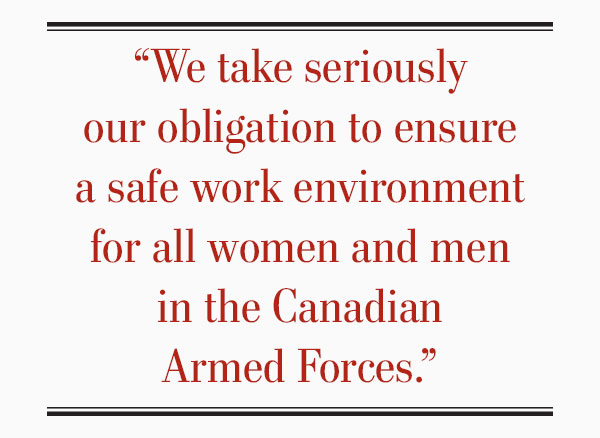
Chief of the Defence Staff General Jonathan Vance has attempted to address the harassment issue head-on by issuing a general order, Operation Honour, which aims to eliminate harmful and inappropriate sexual behaviour in the military. The federal government and plaintiffs in several related class-action lawsuits have agreed to talks. [Stephen J. Thorne]
The federal government and plaintiffs in several class-action lawsuits relating to sexual assault, racism, harassment and discrimination have agreed to set their court proceedings aside and try to talk it out.
Minister of National Defence Harjit Sajjan made the announcement Feb. 23, saying he hoped the move would resolve the matters without a costly litigation process.
“The government will not be proceeding with motions to strike these proceedings,” Sajjan said in a statement. “We look forward to commencing these discussions to bring closure, healing and acknowledgement to the victims.
“We fully acknowledge the impact that racism and harmful and inappropriate sexual behaviour may have on victims and survivors. This behaviour, as well as discrimination based on gender or race, must be stopped in our society.”
Prime Minister Justin Trudeau had earlier expressed dismay over court arguments federal government lawyers made in December when they sought to end a suit by contending the government does not “owe a private law duty of care to individual members within the CAF to provide a safe and harassment-free work environment, or to create policies to prevent sexual harassment or sexual assault.”
They had also argued in Federal Court that there is no obligation “to create policies to prevent sexual harassment or sexual assault which are already prohibited by the Canadian Human Rights Act.”
Trudeau said in February the arguments were “of concern to me, and I’ve asked [Justice Minister Jody Wilson-Raybould] to follow up with the lawyers to make sure that we argue things that are consistent with this government’s philosophy.”
Bruce Feldthusen, a law professor at the University of Ottawa, said the legal arguments don’t mean the government contends it has no obligation to create a safe workplace or prevent sexual misconduct.
“What they’re saying is: ‘We have an obligation to do it under the [Canadian] Human Rights Act, we have an obligation to do something under the [Canadian] Criminal Code, but we don’t have an obligation under negligence law,’” Feldthusen told Global News. “‘We don’t have an obligation to compensate individual victims.’”
He said such arguments make legal sense as part of an attempt to get the lawsuit dismissed by the court, but he didn’t believe they had much chance of success.
At issue are five co-ordinated lawsuits from across the country. The Federal Court was to decide if the cases and another lawsuit could proceed as class actions in July. The two class actions were calling for $800 million in compensation. Another lawsuit was filed by three men alleging discrimination based on race.

A Nova Scotia plaintiff, Glynis Rogers, asserts that she and other female service members faced systemic gender-based discrimination, bullying, harassment and sexual assault by male colleagues.
In a statement of claim filed a year ago, she said the federal government breached the rights of her and other plaintiffs to be free of sex-based discrimination as guaranteed by Section 15 of the Charter of Rights and Freedoms.
“It was common for Ms. Rogers to receive or overhear offensive comments from male members, including her superiors, that demeaned and belittled women,” said the claim, which is untested in court. “Ms. Rogers was personally called a ‘slut’ by male members on numerous occasions, and witnessed the same in relation to others.
“Ms. Rogers experienced a general culture of objectification of women. On various occasions, Ms. Rogers overheard male members conversing and debating about which female members were attractive, ugly, and whether the male members would have sex with them or not.”
The claim alleges senior-level male members, including non-commissioned officers and those with oversight responsibilities, did not take reasonable measures to prevent sexual misconduct or, when they did act, their actions were inadequate or incomplete.
Chief of the Defence Staff General Jonathan Vance has attempted to address the harassment issue head-on by issuing a general order, Operation Honour, which aims to eliminate harmful and inappropriate sexual behaviour.
“We take seriously our obligation to ensure a safe work environment for all women and men in the Canadian Armed Forces,” said Sajjan, adding military leadership has taken concrete action to combat a “serious and unacceptable problem.”
“We have taken unprecedented action to improve and expand victim support…. Members are gaining the confidence to come forward as they see incidents being dealt with in a serious and professional manner.”
He said the same zero-tolerance policy has been applied to racism and discrimination.
Advertisement


















